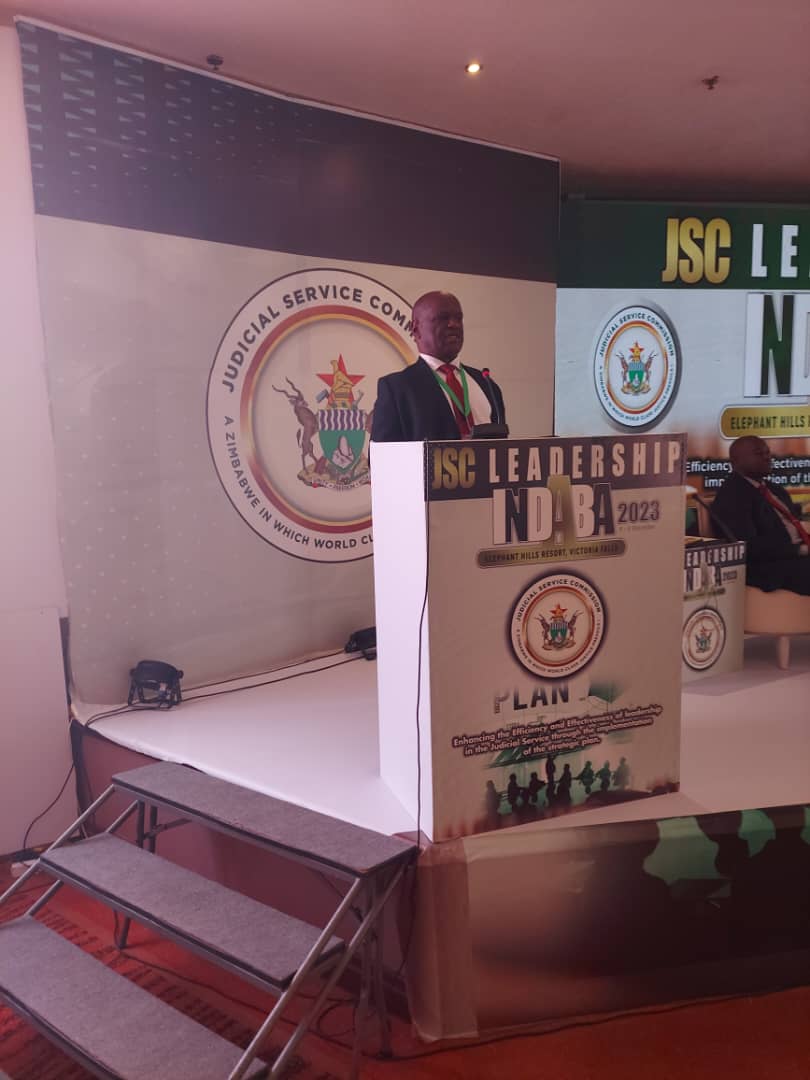The Judicial Service Commission is holding a Leadership Indaba in Victoria Falls from 6 to 10 December 2023 under the theme “Enhancing the efficiency and effectiveness of leadership in the Judicial Service through the implementation of the Strategic Plan.”
“As the theme suggests, we have combined the Leadership Indaba as most of us know it with the mid-term review of the Judicial Service Commission Strategic Plan 2021-2025. Therefore, this specific Leadership Indaba is significant and different as it goes beyond leadership training and development. This Indaba gives us an opportunity as leaders in the Judicial Service Commission, in our different capacities and departments, to reflect on how we have fared in achieving our organizational goals in terms of the Strategic Plan.
“This we are going to do through the 2021-2025 Strategic Plan Mid-term Review validation process which is going to be led by our consultant. Head Hunters International. The review will enable us to see what has worked for us so that we retain it and forge new paths to address the challenges and strategic inflection points that we have encountered along the way. We will be able to plan for how we are going the lead the organisation and our different departments for the last 2 years of this Strategy Cycle better informed by the proceedings of this indaba. The ultimate goal is that come 2025, we will have achieved all our goals in terms of our current Strategic Plan and be on our way to planning for the next cycle, that is 2026-2030 which will be even more significant as our performance at the end of 2030 will feed into the achievement of the national strategic goals under Vision 2030,” Mr. Walter Chikwanha, the Secretary at the Judicial Service Commission said yesterday.
Speaking at the same gathering, the Honourable Mr. Justice Luke Malaba, the Chief Justice of Zimbabwe said the Leadership Conference has brought together judicial officers from all the courts and persons at different levels of leadership within the various departments of the Judicial Service Commission (“JSC”).
He said the Conference anticipates that the Judiciary and all leaders within the JSC will emerge from the Conference with oneness of vision, strategy, and will.
“The participants must be able to interrogate how leadership in Zimbabwe and in the Judicial Service is understood. For the reasons given, the keynote address focuses on the standards and attributes of leadership expected of the Judicial Service. The standards and attributes are discussed against the background of the purpose of the Leadership Conference and in light of the constitutional framework providing for leadership in the Judicial Service,” Justice Malaba said.
He added that the Conference is organised to expose the participants, who are leaders at different levels of governance in the Judicial Service, to the standards of leadership expected of them, insisting there must be an understanding of what leadership is and why persons occupy positions of leadership.
“The Conference is an instrument for the enhancement of leadership within the Judicial Service. Leadership within the Judicial Service is leadership for the people. Such leadership is proactive. If there is proactive leadership within the Judicial Service, the people stand to benefit.
“The obligation to act proactively can only mean one goal for leaders in the Judicial Service. There must be a commonality among them. Commonality is the fact of sharing interests, experiences, or other characteristics with someone or something. Exposing all leaders in the Judicial Service to the same standards of leadership facilitates the emergence of commonality among them. Leaders in the Judicial Service must share the same essential attributes and qualities.”
In terms of section 3 of the Judicial Service Act [Chapter 7:18] the Judicial Service consists of a number of members including Judges, persons presiding over the magistrates’ courts, the Secretary of the JSC, and all other support staff of the Judicial Service.
The provisions of the Judicial Service Act must be read together with section 162 of the Constitution, which provides that judicial authority derives from the people of Zimbabwe and is vested in the courts. Subsection (2) of section 190 of the Constitution gives the JSC the powers needed to execute its functions in terms of that provision. Section 332 of the Constitution goes further to describe a public officer as a person holding or acting in a public office.
There is a well-defined legal framework under which the source of the authority of leaders in the Judicial Service is from the people. By virtue of holding offices that are provided for by statute and who can be defined as public officers, leaders in the Judicial Service must understand that the public is the source of their power.
